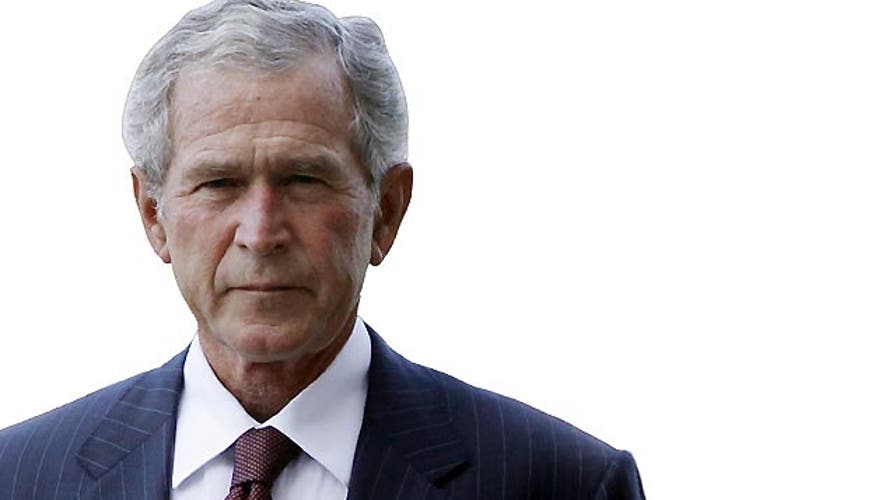When he left the White House in January 2009 after two tumultuous terms, President George W. Bush -- the only man to attain the presidency by virtue of a Supreme Court ruling and only the second son of a president to also serve as president -- was nursing an approval rating around 30 percent.
Four years later, however, public opinion has turned slowly but steadily in the former president’s direction. A nationwide Fox News poll conducted earlier this week now finds registered voters evenly split in their assessments of the 43rd president -- a verdict roughly equal to the esteem in which they hold his successor, President Obama.
As Bush prepares to attend the dedication of his presidential library in Dallas, Texas, on Thursday, his increasing approval generally mirrors the trend for other former presidents, but Bush's turnaround is remarkable, given how low the numbers were when he left office. At his lowest, amid the dark days of the financial collapse in October 2008, only 23 percent rated Bush positively.
Throughout President Obama’s first term -- when the incumbent relentlessly blamed his predecessor for the state of the economy and a host of national security problems -- Bush, aside from promoting his 2010 memoir and giving a small number of paid speeches, mostly remained silent. This was in keeping with the practice of his father, George H.W. Bush, of never criticizing his successor, and it may partially explain the rise in esteem for the younger Bush.
“People are perhaps beginning to appreciate that President Bush, for all his Texas swagger, is a gentleman,” Fox News senior political analyst Brit Hume said.
“I wish that some of my fellow scholars, particularly historians and law professors and political scientists, would do what academics are supposed to do, which is to bide their time, do the actual research before proclaiming a presidency a failure,” said Stephen Knott, a U.S. Naval War College professor and author of a book about Bush. He described the Bush legacy as "unfinished."
“It takes a long time for documents, for oral history interviews, particularly classified documents, to emerge," Knott said. "And then you get a fuller, more complete picture of a presidency.”
Presidential historian Douglas Brinkley said he wasn't surprised by Bush's rising approval rating.
“We pummel presidents when they’re in the White House," said Brinkley, whose 2007 book "The Great Deluge" was critical of Bush's handling of the aftermath of Hurricane Katrina. "We give them a hard time. Then they leave and they write a memoir that becomes an instant bestseller. Journalists ask softball questions, and then they open up a presidential library. And people forgive a lot of the mistakes and say, ‘Hey, he brought our country through some tough times.'"
The toughest time for Americans during Bush's presidency was Sept. 11, 2001, when Al Qaeda hijacked and crashed four airplanes, killing nearly 3,000 Americans while toppling the World Trade Center's twin towers and crippling the Pentagon.
Brinkley lauded the series of speeches and impromptu remarks that Bush gave in the days immediately following 9/11, including the memorable moment when he used a bullhorn and, standing with a New York City firefighter amid the rubble of the twin towers, declared that “the people who knocked these buildings down will hear all of us soon." During that period, Bush earned the gratitude of all Americans, including those opposed to him politically, Brinkley said.
“I think that because 9/11 is such a defining moment in our lives -- like Pearl Harbor or the Kennedy assassination -- people will start remembering 9/11,” Brinkley told Fox News. “George W. Bush, in my opinion, did a pretty good job of uniting the country in those weeks of dire need. He communicated well; the government functioned."
Brinkley noted the creation of the Department of Homeland Security and specific security enhancements at America’s airports.
"And we did not get hit again. We weren’t struck again after 9/11," Brinkley said. "He did the best he could.”
Bush's legacy, however, also will be inextricably tied to the still-evolving fates of the countries he ordered American troops to invade in the aftermath of 9/11: Afghanistan and Iraq. The president, as well as aides like Condoleezza Rice, cautioned repeatedly during his two terms that the verdict on the success of those massive, multifaceted undertakings -- military, political, economic -- could not properly be rendered for 50 years or more.
Other aspects of Bush's presidency also loom large, such as the enactment of across-the-board tax cuts, the expansion of Medicare to include prescription drug coverage, the No Child Left Behind education reforms and a massive push to fight AIDS in Africa. A financial collapse also struck at the end of Bush's tenure, though some trace its origins to the enactment of deregulatory housing policies in the Clinton era.
A Washington Post/ABC News poll found majorities still disapproving of Bush’s handling of Iraq and the economy, but history offers some hope for Bush that his standing may rise further.
“The fact is it's very difficult to get an accurate assessment of an American presidency, certainly while it's going on, but even four or five years after it's ended,” Knott said. “It took at least 20 years before Truman began to creep up on those lists of presidential greatness.”





